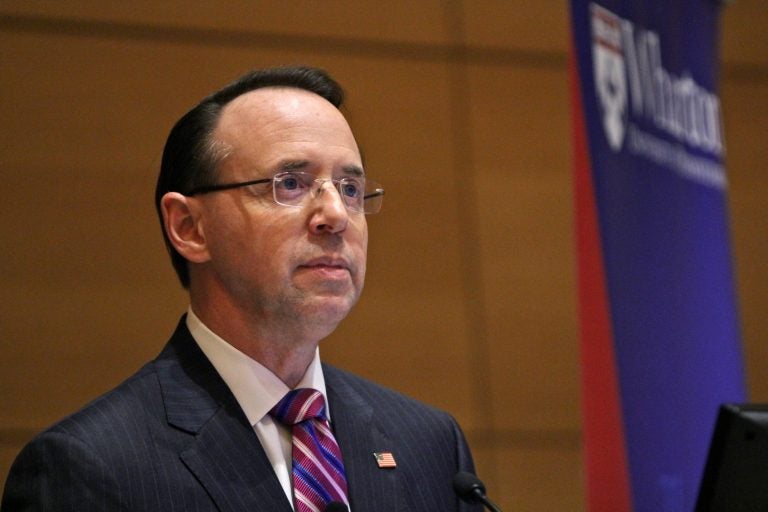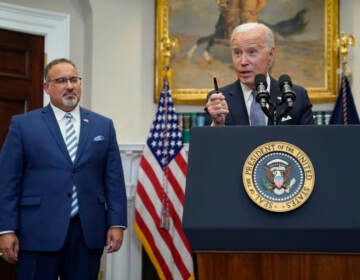Outgoing Deputy AG Rosenstein discusses DOJ tenure with Wharton students
Deputy Attorney General Rod Rosenstein, who’s endured jabs by President Trump, says his job means ignoring politics and carrying out the administration’s priorities.

Deputy Attorney General Rod J. Rosenstein speaks at his alma mater, The Wharton School of the University of Pennsylvania. (Emma Lee/WHYY)
U.S. Deputy Attorney General Rod Rosenstein paid a visit to his alma mater in Philadelphia Thursday to discuss the rule of law, how it intersects with business and his time in the Department of Justice.
Rosenstein, Wharton School of Business Class of ’86, spoke as part of the school’s Legal Studies and Business Ethics Lectures Series.
Rosenstein, who is expected to step down from the No. 2 post in the Justice Department now that the Senate has confirmed William Barr as attorney general, spoke of corporate leaders’ responsibility to uphold the rule of law.
“Law provides the framework for people to conduct their lives freely and enter into transactions with confidence … business depends on law,” he told students. “It provides the floor that supports the market and the walls that surround it. The integrity and reliability of our financial system rests on the credibility of our legal system.”
He encouraged students to commit to what he called the rule of law.
Students who submitted questions appeared to be more interested in the Justice Department’s independence, alluding to an adversarial time between President Donald Trump and the agency which oversees the investigation into Russian meddling in the 2016 election.
Rosenstein said the department is supposed to carry out the administration’s priorities.
“It’s not about independence from political policy decisions, but once those policy decisions are made, I’m responsible for ensuring that the decision-making throughout the department about how to implement those policies is not influenced by inappropriate considerations, including political considerations,” he said.
The department must ignore politics when deciding which cases to prosecute, he said.
Rosenstein, who has been in the department through five administrations — Republican and Democrat — was asked how a president’s leadership style and temperament can affect the work of the DOJ.
Saying the attorney general’s leadership style has a greater bearing on the work, he said it’s important to distinguish between political commentary and the actual work of the DOJ.
“We have the support of the administration to run it in the right way,” he explained. “It doesn’t mean that they’re always going to agree with us. We’re in an environment where politicians are required to express their opinions about a whole range of thing.”
Rosenstein has drawn national media attention several times during his tenure as deputy attorney general.
He wrote the memo Trump originally cited as a basis for firing FBI Director James Comey. Rosenstein wrote Comey made “serious mistakes” when handling the investigation of Hillary Clinton’s use of a private server for emails.
For a time, Rosenstein oversaw the Russia investigation, which is probing whether Russian officials colluded with the Trump campaign, after previous Attorney General Jeff Sessions recused himself.
Rosenstein, who appointed special counsel Robert Mueller to handle the investigation shortly after Comey was fired, has been the subject of attacks by the president on Twitter.
Rosenstein told students he helped make strides on many of the president’s priorities including reducing violent crime, enhancing support for police and curtailing opioid abuse.
WHYY is your source for fact-based, in-depth journalism and information. As a nonprofit organization, we rely on financial support from readers like you. Please give today.




